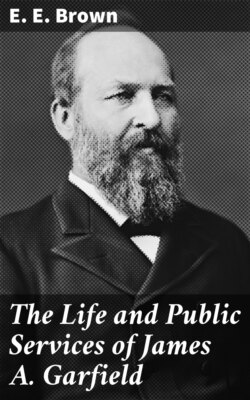Читать книгу The Life and Public Services of James A. Garfield - E. E. Brown - Страница 13
На сайте Литреса книга снята с продажи.
CHAPTER IX.
ОглавлениеTable of Contents
Ready for College.—His Uncle lends him Five Hundred Dollars.—Why he Decides to go to Williams.—College Life.
After spending three years at Hiram in faithful, persistent study, James felt he was prepared to enter the junior class at almost any college. But how was he to procure the means to carry on his studies? Thus far he had defrayed all his expenses by his own exertions as janitor, carpenter, and teacher; but, to enter college, he would need a little money in advance. His proud, independent spirit shrank from borrowing even from his friends. At last, he went to his uncle, Thomas Garfield, and asked for the use of five hundred dollars until he could earn enough money by teaching to pay it back.
His uncle Thomas had always shown a kindly interest in his efforts to obtain an education, and now gladly advanced him the sum he desired. In order to make sure the payment in case of his death, James procured a policy upon his life to the value of five hundred dollars, and presented it to his uncle.
He had now, as he thought, the necessary means to enter college, but which of the many inviting doors should he enter? Every one seemed to take it for granted that he would go to Bethany College; which was under the patronage of his own denomination, but, in a letter to a friend, he gave his final decision as follows:—
"After thinking it all over, I have made up my mind to go to Williamstown, Mass. … There are three reasons why I have decided not to go to Bethany:—1st. The course of study is not so extensive or thorough as in eastern colleges. 2d. Bethany leans too heavily toward slavery. 3d. I am the son of Disciple parents, am one myself, and have had but little acquaintance with people of other views; and having always lived in the West, I think it will make me more liberal both in my religious and general views and sentiments, to go into a new circle, where I shall be under new influence. Therefore, I wrote to the presidents of Brown University, Yale and Williams, setting forth the amount of study I had done, and asking how long it would take me to finish their course.
"Their answers are now before me. All tell me I can graduate in two years. They are all brief, business notes, but President Hopkins concludes with this sentence: 'If you come here we shall be glad to do what we can for you.' Other things being so nearly equal, this sentence, which seems to be a kind of friendly grasp of the hand, has settled that question for me. I shall start for Williams next week."
It was at the close of the summer term in 1854 that James presented himself before President Hopkins for examination. He is described at this time "as a tall, awkward youth, with a great shock of light hair, rising nearly erect from a broad, high forehead, and an open, kindly, and thoughtful face, which showed no traces of his long struggle with poverty and privation."
He passed the examination without difficulty, and soon became a great favorite with his class in spite of his shabby clothes and Western provincialisms. "Old Gar" and the "Ohio giant" were the names by which he was best known in college, and a classmate says of him that "he immediately took a stand above all his companions for accurate scholarship, and won high honors as a writer, reasoner, and debater."
The beautiful, mountainous scenery about Williamstown was a constant delight to the young Westerner. He would frequently climb to the top of Greylock and feast his eyes upon the magnificent panorama below. He was no longer obliged to work at the carpenter's bench, or perform the duties of janitor, and these long walks gave him needful exercise as well as pleasant recreation.
President Hopkins became greatly interested in the earnest, enthusiastic student. The "friendly hand-grasp" was extended to him in many ways, and, when the summer vacation came, he offered him the free use of the college library.
James gladly availed himself of this privilege, and browsed among the books to his heart's content. It was the first time in his life that he had ever found leisure to read the works of Shakespeare, consecutively. During the summer vacation he not only read and thoroughly studied the plays, but committed large portions of them to memory. He also varied his heavier reading with works of fiction, allowing himself one novel a month. Dickens and Thackeray were favorite authors, and Tennyson's poems were read with ever-increasing pleasure.
He completed his classical studies the first year he was at Williamstown, as he had entered far in advance of the other pupils. He then took up German as an elective study, and, in the space of a few months, had made such rapid progress that he could read Goethe and Schiller, and converse with fluency.
In the "Williams Quarterly," a magazine published by the students, James took great interest, and was a frequent contributor both in prose and poetry.
The following poem, entitled "Memory," he wrote the last year he was at Williams College:—
